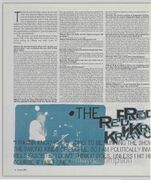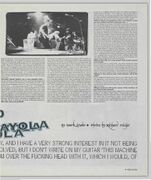Shows/1998-08-30: Difference between revisions
No edit summary |
|||
| Line 31: | Line 31: | ||
August 29, 1998 | August 29, 1998 | ||
Mark Szabo<gallery mode="packed"> | Mark Szabo and Randy Gelling | ||
<blockquote> | |||
The Red Krayola have been making records since 1966. Their rather out-of-place place in pop music is secure, because instigator Mayo Thompson has popped up every time since its birth when there was an opportunity to make music that was truly experimental. Their latest album, Hazel, is on Drag City and features such current luminaries as David Grubbs and John McEntire. The collaborative effort that is The Red Krayola has stayed fresh by a willingness to rigorously experiment, musically and conceptually. | |||
Mayo Thompson was jointly interviewed on Sunday, August 29th, in the alley behind the Starfish Room, by Randy Gelling for Offbeat and Mark Szabo for Discorder. | |||
Offbeat: The first Red Krayola album that I bought was Coconut Hotel. I was wondering what you think of that album today? | |||
Mayo: I stand by every record I've made. I don't think we've made a false step yet. I hope that doesn't sound too self-congratulatory, but, in fact, I think that Coconut Hotel is one of our best albums. When we made the first album, Parable of Arable Land, we just didn't want to repeat it. We thought, 'What are you gonna do after that?' We made Coconut Hotel before God Bless The Red Krayola And All Who Sails With It. Another key record will come out in October, which is the live '67 stuff, the feedback stuff we were doing at the Berkeley Folk Festival [with] John Fahey, who sat in with us. Unfortunately, the tapes we made with John Fahey in the studio I cannot find, and I have been trying. We went into the studio and made some stuff with him which was wonderful. It's lost. I think it's in Nashville. On Coconut Hotel, I think one hears [what] we started in the '60s. The idea - and it's kinda coherent with modernism - was to push the envelope, push the limits. It is a question of saying, 'How about this? How about this? Does this meet it?' and not in a sort of platonic idea, a fixed idea of what the ontology of the item might be, and then simply satisfying it in some sort of mimetic or representational sort of relation, but in a more inductive relation. Two in one headed auras and all those kinds of things make a difference to the way the things are put together. The other thing that makes a difference is, if you think you're going to make extreme music in the '60s, and the '60s was very much about being extreme, right? Grateful Dead? That's not extreme. What's so extreme about a blues revival? This looks like business as fucking usual to me. It was about being there and who you are a sense of who you're with. You could be playing 'Mary Had A Little Lamb' and why not? Not to say anything against 'Mary Had A Little Lamb.' It's a nice tune. What I'm saying is that it doesn't matter what value you slug in there, it doesn't make that much difference. | |||
Offbeat: It seems that many of the bands that survived the '60s least appealed to the hippies at the time, like the Velvets. | |||
They were emblematic of the opposite of everything anybody thinks they hold holy, anywhere in the whole wide world. Our game was, we didn't like many people at all. We didn't like anything, much. We listened to a lot of music, and felt strongly about this and that. When we got to California, they asked us in Berkeley, 'Who do you want to meet?' and we said John Fahey. He was the only person we could think of who was doing something that was responsive to the things we were interested in, such as Albert Ayler, Miles Davis, all the findings in jazz, and also Morton Feldman, and John Cage, and Stockhausen. I think Stockhausen is wonderful. Great theatrics and wonderful play on ideas and words; Cage is more pedantic, in the long run, but fine. He's more of a teacher, a guru figure. That's another thing about the '60s, I don't give a fuck about no guru. | |||
Offbeat: Don't you think that the hippie viewpoint still dominates - | |||
Like German ideology won the war, right? | |||
Offbeat: Still dominates most underground rock? | |||
It certainly does. I've got nothing against hippies as long as they stay out of my way. They run good record companies, sometimes they open decent coffee shops, because they are fastidious about detail, but for me it's an extension of possessive individualism. It relies on some coherent philosophy of individualism as such. | |||
Discorder: I'd like to talk a bit about the Rough Trade days. You went to London... | |||
In '77. The situation [transcription incomplete] | |||
</blockquote> | |||
<gallery mode="packed"> | |||
File:Shows-1998-08-30-interview1.jpg| | File:Shows-1998-08-30-interview1.jpg| | ||
File:Shows-1998-08-30-interview2.jpg| | File:Shows-1998-08-30-interview2.jpg| | ||
</gallery> | </gallery> | ||
== References == | == References == | ||
{{Shows|1998}} | {{Shows|1998}} | ||
Latest revision as of 16:26, 26 October 2025
| August 30, 1998 | |
|---|---|
| [[File:|center|frameless|]] | |
| [[File:|center|frameless|]] | |
| Starfish Room | |
| City | |
| Tour | |
| Event | |
| Billing | |
Listings
Discorder
August 1998
Reviews
Discorder
October 1998
Julie Colero
I really liked ... no, let's start again. I couldn't have expected a worse ... um, still not quite capturing the evening. I liked David Grubbs' punk rawkin' whilst Red Krayola-ing. There. Perfect.
Interview
Discorder
August 29, 1998
Mark Szabo and Randy Gelling
The Red Krayola have been making records since 1966. Their rather out-of-place place in pop music is secure, because instigator Mayo Thompson has popped up every time since its birth when there was an opportunity to make music that was truly experimental. Their latest album, Hazel, is on Drag City and features such current luminaries as David Grubbs and John McEntire. The collaborative effort that is The Red Krayola has stayed fresh by a willingness to rigorously experiment, musically and conceptually.
Mayo Thompson was jointly interviewed on Sunday, August 29th, in the alley behind the Starfish Room, by Randy Gelling for Offbeat and Mark Szabo for Discorder.
Offbeat: The first Red Krayola album that I bought was Coconut Hotel. I was wondering what you think of that album today?
Mayo: I stand by every record I've made. I don't think we've made a false step yet. I hope that doesn't sound too self-congratulatory, but, in fact, I think that Coconut Hotel is one of our best albums. When we made the first album, Parable of Arable Land, we just didn't want to repeat it. We thought, 'What are you gonna do after that?' We made Coconut Hotel before God Bless The Red Krayola And All Who Sails With It. Another key record will come out in October, which is the live '67 stuff, the feedback stuff we were doing at the Berkeley Folk Festival [with] John Fahey, who sat in with us. Unfortunately, the tapes we made with John Fahey in the studio I cannot find, and I have been trying. We went into the studio and made some stuff with him which was wonderful. It's lost. I think it's in Nashville. On Coconut Hotel, I think one hears [what] we started in the '60s. The idea - and it's kinda coherent with modernism - was to push the envelope, push the limits. It is a question of saying, 'How about this? How about this? Does this meet it?' and not in a sort of platonic idea, a fixed idea of what the ontology of the item might be, and then simply satisfying it in some sort of mimetic or representational sort of relation, but in a more inductive relation. Two in one headed auras and all those kinds of things make a difference to the way the things are put together. The other thing that makes a difference is, if you think you're going to make extreme music in the '60s, and the '60s was very much about being extreme, right? Grateful Dead? That's not extreme. What's so extreme about a blues revival? This looks like business as fucking usual to me. It was about being there and who you are a sense of who you're with. You could be playing 'Mary Had A Little Lamb' and why not? Not to say anything against 'Mary Had A Little Lamb.' It's a nice tune. What I'm saying is that it doesn't matter what value you slug in there, it doesn't make that much difference.
Offbeat: It seems that many of the bands that survived the '60s least appealed to the hippies at the time, like the Velvets.
They were emblematic of the opposite of everything anybody thinks they hold holy, anywhere in the whole wide world. Our game was, we didn't like many people at all. We didn't like anything, much. We listened to a lot of music, and felt strongly about this and that. When we got to California, they asked us in Berkeley, 'Who do you want to meet?' and we said John Fahey. He was the only person we could think of who was doing something that was responsive to the things we were interested in, such as Albert Ayler, Miles Davis, all the findings in jazz, and also Morton Feldman, and John Cage, and Stockhausen. I think Stockhausen is wonderful. Great theatrics and wonderful play on ideas and words; Cage is more pedantic, in the long run, but fine. He's more of a teacher, a guru figure. That's another thing about the '60s, I don't give a fuck about no guru.
Offbeat: Don't you think that the hippie viewpoint still dominates -
Like German ideology won the war, right?
Offbeat: Still dominates most underground rock?
It certainly does. I've got nothing against hippies as long as they stay out of my way. They run good record companies, sometimes they open decent coffee shops, because they are fastidious about detail, but for me it's an extension of possessive individualism. It relies on some coherent philosophy of individualism as such.
Discorder: I'd like to talk a bit about the Rough Trade days. You went to London...
In '77. The situation [transcription incomplete]
References
| The Red Krayola Shows | |||||||||
|---|---|---|---|---|---|---|---|---|---|
| 1966, 1967, 1968 | 1969 | 1970 | 1971 | 1972 | 1973 | 1974 | 1975 | ||
| 1976 | 1977 | 1978 | 1979 | 1980 | 1981 | 1982 | 1983 | 1984 | 1985 |
| 1986 | 1987 | 1988 | 1989 | 1990 | 1991 | 1992 | 1993 | 1994 | 1995 |
| 1996 | 1997 | 1998 | 1999 | 2000 | 2001 | 2002 | 2003 | 2004 | 2005 |
| 2006 | 2007 | 2008 | 2009 | 2010 | 2011 | 2012 | 2013 | 2014 | 2015 |
| 2016 | 2017 | 2018 | 2019 | 2020 | 2021 | 2022 | 2023 | 2024 | 2025 |
| Live recordings | |||||||||

